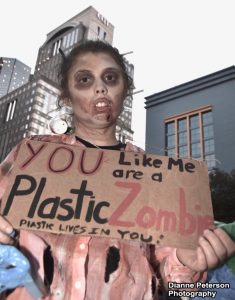At the 2019 WV Science Teachers Association Conference, retired school teacher Randi Pokladnik, PhD, presented three curricula for high school teachers to use in their classrooms:
- Climate Change: The Science and Solutions;
- The Benefits of Renewable Energy; and
- Fracking, Cracker Plants, Plastics, and You.
Plastics are everywhere. We cannot imagine a life without them or the convenience they provide.
However, there is a huge downside to the story of plastics. From cradle to grave, plastics are leaving an undeniable toxic trail behind them. Our oceans, land, and even our own bodies have become a final resting place for a material that basically never degrades. We now have plasticizers in our bloodstreams and microplastics in our feces.
How does plastic and the process of making plastics affect you and the environment? How can we cut back on our dependence of this material that causes enormous negative impacts on our planet and our own health?
These are some of the questions examined in Fracking, Cracker Plants, Plastics, and You. A pdf of this lesson plan is below, along with supporting materials, which you may download to use in your classroom, no matter where you are.
Find the The Benefits of Renewable Energy lesson plan here and Climate Change: The Science and Solutions lesson plan here.
If you would like the PowerPoint version of Fracking, Cracker Plants, Plastics, and You shared with you via Google Drive, please e-mail info@ohvec.org.
FAIR USE NOTICE: This mayor may not contain copyrighted material the use of which has not always been specifically authorized by the copyright owner. We are making such material available in our efforts to advance understanding of criminal justice, political, human rights, economic, democracy, scientific, and social justice issues, etc. We believe this constitutes a fair use of any such copyrighted material as provided for in section 107 of the US Copyright Law. In accordance with Title 17 U.S.C. Section 107, the material on this site is distributed without profit to those who have expressed a prior interest in receiving the included information for research and educational purposes. For more info: http://www.law.cornell.edu/uscode/17/107.shtml.
Supporting materials








